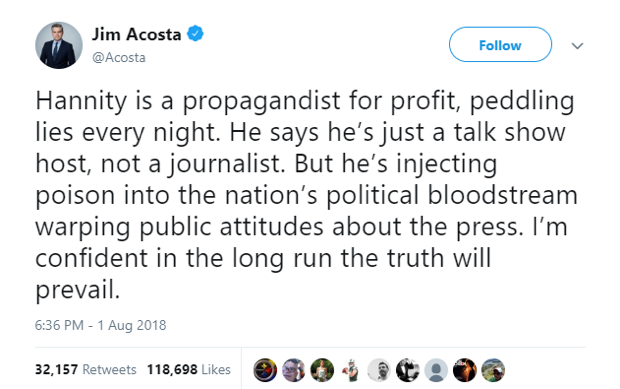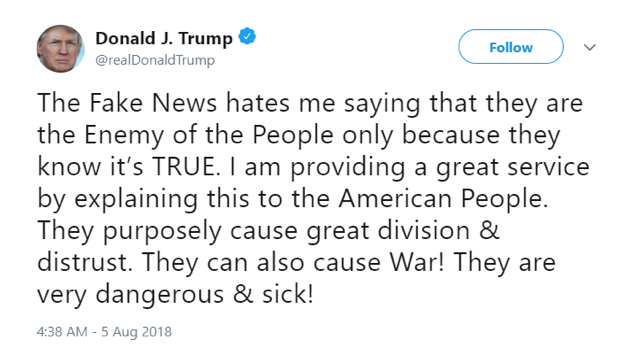US - #WeeklyAddress July 31 - August 6: New York Times journalist harassed for past tweets
Below are the most notable incidents regarding threats to press freedom in the US during the week of July 31 - August 6:
New York Times journalist harassed for past tweets
Newly-hired New York Times journalist Sarah Jeong has been the source of public controversy over tweets she posted in 2014. Jeong claims she attempted to use the rhetoric of her online abusers in what she described as “counter-trolling.” Critics have called her tweets “racist,” leading to a surge of online harassment against Jeong. The Times issued a statement supporting her while also stating it did not condone her tweets. Jeong’s current employer, The Verge, took a firmer position against the attacks on Jeong, calling them “abusive,” “outrageous” and a distraction to turn outlets against their own reporters. RSF recently published its Online Harassment of Journalists report that highlights similar incidents of harassment against journalists–particularly female journalists–like Jeong. “This form of online harassment to discredit journalists is a new way to censor them,” says Elodie Vialle, Head of RSF’s Journalism and Technology Desk. “making it one of the biggest threat to press freedom today.”
Detroit man attacks, vandalizes news van
A Detroit man faces felony charges after attacking journalists who were reporting on a fatal crash during the morning hours of August 2. According to reports, the attacker, Edmund Gilliam, used a metal pole to threaten WXYZ and WWJ reporters, eventually striking and damaging the windshield and mirror of both news vans. Reporter Mike Campbell was in the middle of a live broadcast when the vandalism occurred. Police found the suspect walking nearby but were met with resistance, prompting the officers to taze and arrest the man after he struck one officer with a piece of concrete. Gilliam is being charged with multiple counts of felonious assault, multiple counts of malicious destruction of property, obstructing a police officer, and resisting.
Journalist harassed, stalked by potential source
The Columbia Journalism Review (CJR) published the account of journalist Steven Petrow, who had been harrassed and stalked for six months before the man appeared at his home. Petrow met with the man in September as a potential source for an article he was working on about mental health. Over the course of several months, the source stalked Petrow on social media, sending him messages indicating that he was following him without his knowledge. After months of intimidating messages, Petrow’s harasser sent him a message that read: “We’ll speak face-to-face…. If anyone were to shoot and kill you it would not be a loss at all!” Though the messages eventually stopped, in June the man appeared on Petrow’s front steps, banging on his door and yelling about one of his recent articles. The man was arrested later that afternoon. Petrow’s account is a harrowing reminder of the increasing hostility and harassment journalists face online and the very real danger of that harassment becoming physical.
Trump rally attendees heckle CNN’s Jim Acosta in Florida
Chief White House Correspondent Jim Acosta’s live coverage of a July 31 Florida rally for President Donald Trump was met with incessant heckling and roaring chants of “CNN sucks,” “go home,” and “fake news” from the angry crowd. Acosta responded to the insults on-air, stating: “All of those things are false and we’re gonna stay right here, do our job, and report to all of our viewers here tonight.” Fox News host Sean Hannity added fuel to the fire in his opening monologue that night, saying Acosta deserved the treatment. Acosta responded to the criticism with his own retort, stating, “Hannity is a propagandist for profit” and he’s “injecting poison into the nation's political bloodstream.”

President Trump and his son, Eric Trump, retweeted a video of rally-goers heckling Acosta.
Sarah Sanders blames journalists for leaks about bin Laden in the ‘90s
In an August 1 press briefing, White House Press Secretary Sarah Sanders asserted that journalists were responsible for impeding US intelligence agencies in the years leading up to the 9/11 attacks, a falsehood which has previously been debunked. “One of the worst cases was the reporting on the US ability to listen to Osama bin Laden's satellite phone in the late 90s. Because of that reporting, he stopped using that phone and the country lost valuable intelligence.” The press secretary was attempting to rebut a question posed to her regarding the conduct of President Trump supporters who berated journalists at recent rallies. The bin Laden incident that Sanders referred to was widely refuted years ago.
White House holds three press briefings in July
The White House held only three press briefings—for a total of 58 minutes—in the month of July. The length and quantity of White House press briefings have seen a consistent decrease throughout the Trump presidency. From January to June, the average length of press briefings declined from 30 minutes to just under 17 minutes.
Trump doubles down on ‘enemy of the people’ rhetoric In a August 5 tweet, Trump again used the phrase “enemy of the people” when referring to the media, claiming they cause great division and distrust, and even war.

This is one of six “fake news” tweets Trump wrote in the past week. On July 31 he called the media “totally unhinged” and on August 2 he again called the “fake news” media the “enemy of the people.”
The United States ranks 45th out of 180 countries in RSF's 2018 World Press Freedom Index after falling 2 places in the last year.
For the latest updates, follow RSF on twitter @RSF_en.



